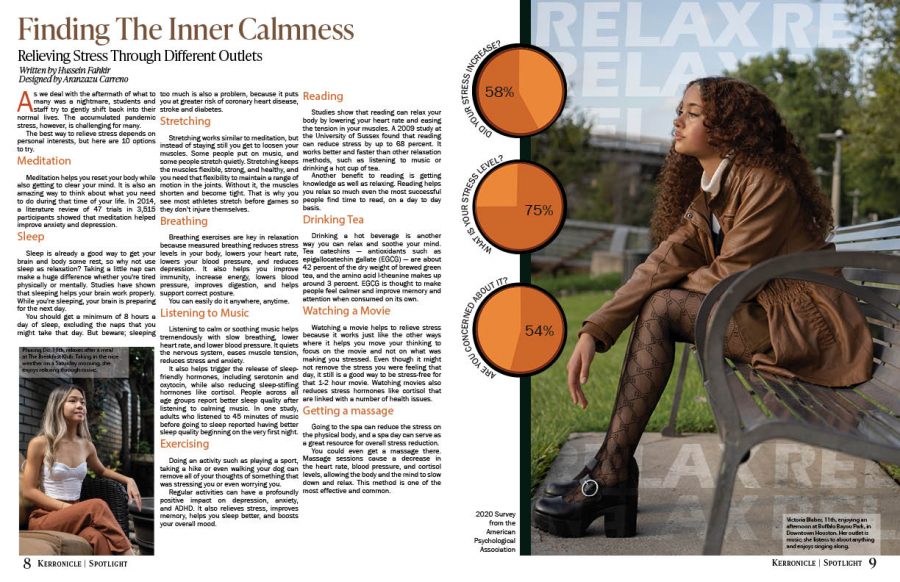Finding The Inner Calmness
November 1, 2021
As we deal with the aftermath of what to many was a nightmare, students and staff try to gently shift back into their “normal” lives. The accumulated pandemic stress, however, is too much for many. A survey was done on adults and children to see how stressed they were at the time that survey was taken. The survey found that the average reported stress level during the prior month was 5.6, (on a scale from 1 to 10 where 1 means “little to no stress” and 10 means “a great deal of stress”).
There are an infinite amount of ways for someone to release their stress, the outlet often found through personal interests. Here you will be learning ten ways to deal with stress that you might or might not have known.
Meditation is the key to the body and the soul. It helps you reset your body while also getting to clear your mind. It is also an amazing way to think about what you need to do during that time of your life. In 2014, a literature review of 47 trials in 3,515 participants showed that meditation helps improve anxiety and depression.
Sleep is already a good way to get your brain and body some rest, so why not use sleep as a way of relaxation? Since you sleep during the night, you don’t have to go on a huge amount of sleep during the day.
Taking a little nap can make a huge difference whether you’re tired physically or mentally. Think of it as your second life in a game; because, just like in a game, once you get tired or overworked and get a little of rest your back up strong to start off the day!
Studies have shown that sleeping helps your brain work properly. While you’re sleeping, your brain is preparing for the next day. You should get a minimum of 8 hours a day of sleep, excluding the naps that you might take that day. But beware; sleeping too much is also a problem, because sleeping too much puts you at greater risk of coronary heart disease, stroke and diabetes than sleeping too little.
Stretching is one of the ways that will help you physically relax. It works similar to meditation but instead of staying still you get to loosen your muscles. Some people put on music, and some people stretch quietly. Stretching keeps the muscles flexible, strong, and healthy, and you need that flexibility to maintain a range of motion in the joints. Without it, the muscles shorten and become tight. That is why you see most athletes stretch before games so they don’t injure themselves.
Breathing exercises is a key in relaxation because it calms you down. If you are heated, mad or even sad it will help you physically and mentally calm down. Breathing reduces stress levels in your body, lower your heart rate, lower your blood pressure, and reduces depression. It also helps you improve immunity, increase energy, lowers blood pressure, improves digestion, and helps support correct posture.
It’s my favorite way of relaxation and it’s the most common because you can easily do it anywhere, anytime.
Listening to calm or soothing music helps tremendously with slow breathing, lower heart rate, and lower blood pressure. It quiets the nervous system, eases muscle tension, reduces stress and anxiety.
It also helps trigger the release of sleep-friendly hormones, including serotonin and oxytocin, while also
reducing sleep-stifling hormones like cortisol. People across all age groups report better sleep quality after listening to calming music. In one study, adults who listened to 45 minutes of music before going to sleep reported having better sleep quality beginning on the very first night.
Doing an activity such as playing a sport, taking a hike or even walking your dog can remove all of your thoughts of something that was stressing you or even worrying you. By using your muscles and your brain is being worked. You focus on whatever activity you’re doing, causing you to forget about anything you want to forget about. Regular activities can have a profoundly positive impact on depression, anxiety, and ADHD. It also relieves stress, improves memory, helps you sleep better, and boosts your overall mood.
Studies show that reading can relax your body by lowering your heart rate and easing the tension in your muscles. A 2009 study at the University of Sussex found that reading can reduce stress by up to 68%. It works better and faster than other relaxation methods, such as listening to music or drinking a hot cup of tea.
Another benefit to reading is getting knowledge as well as relaxing. Reading helps you relax so much even the most successful people find time to read, on a day to day basis.
Drinking a hot beverage is another way you can relax and soothe your mind. Tea catechins — antioxidants such as epigallocatechin gallate (EGCG) — are about 42% of the dry weight of brewed green tea, and the amino acid l-theanine makes up around 3%. EGCG is thought to make people feel calmer and improve memory and attention when consumed on its own.
Watching a movie helps to relieve stress because it works just like the other ways where it helps you move your thinking to focus on the movie and not on what was making you stressed. Even though it might not remove the stress you were feeling that day, it still is a good way to be stress free for that 1-2 hour movie. Watching movies also reduces stress hormones (like Cortisol) that are linked with a number of health issues.
Going to the spa is an awesome way to remove stress, because it is so relaxing. Spas can also help reduce the stress on our physical body, and a spa day can serve as a great resource for overall stress reduction.
You could even get a massage there. Massage sessions cause a decrease in the heart rate, blood pressure, and cortisol levels, allowing the body and the mind to slow down and relax. This method is one of the most effective and common.
The following stress statistics are from surveys conducted by the APA: 54% of Americans are concerned about the level of stress in their everyday lives. 75% of adults reported experiencing moderate to high levels of stress in the past month. 42% of adults reported that their stress has increased in the past year. Now you have learned ten ways to be stress-free, and if you have other ways to be stress free that’s even better!











